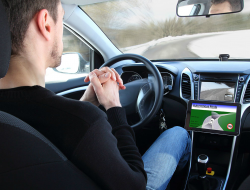
— The National Highway Traffic Safety Administration (NHTSA) is allegedly the agency responsible for the safety of autos and consumers on the roads.
But according to independent safety advocates, NHTSA has left its responsibilities to automakers, even more so concerning the subject of self-driving cars.
The latest word from federal regulators won't change the opinions of consumer advocates as NHTSA released a statement saying it will soon seek comments on what the agency needs to do to find and remove “unnecessary regulatory barriers” to self-driving cars.
The input is mostly for driverless cars that aren't equipped with steering wheels, pedals or other equipment used by human drivers.
Safety standards for vehicles were written at a time when a self-driving car was nothing more than wild science fiction, a problem that automakers, regulators and Congress will need to rectify to get cars without steering wheels and pedals on the roads.
For auto safety advocates, it will be another sign that NHTSA is trying to move too quickly on driverless cars without considering the potential safety risks.
Consumer organization, Consumer Watchdog, has join other advocacy groups in denouncing NHTSA's voluntary guidelines for autonomous cars while singling out California's actions as a "license to kill."
California at first worked on regulations that required steering wheels and pedals in driverless cars, including cars on the roads used as test vehicles. But automakers weren't thrilled and complained the proposed regulations were too burdensome and would hinder innovation.
California amended their guidelines to follow federal regulators, an action Consumer Watchdog said was to "provide no enforceable safety standards and new amendments would allow automakers to escape responsibility when their robot technology fails."
California's first driverless car proposal had teeth that would have held manufacturers liable when the cars caused crash incidents, but the state changed the proposal wording to give automakers free reign to take the focus off safety and more on turning travelers into guinea pigs.
Based on history, creating voluntary guidelines for automakers leaves those companies the ability to do what they want without fear of breaking the rules because those "rules" are voluntary.
When problems occur with vehicles, the typical response from automakers is to place blame on vehicle owners and drivers, something not expected to change with self-driving cars.
“You can be assured that whenever there is a crash involving an autonomous vehicle, the manufacture will tell the operator, ‘You didn’t properly maintain the vehicle.’ The burden of proof falls to the operator and even worse the manufacturer sets the standards for maintenance." - Consumer Watchdog
Consumer advocates are also concerned about erasing the role of municipal governments in deciding how driverless cars will be tested on local roads and highways.
California and other states have no worries about driverless car safety regulations because those states simply refer to federal regulations, and that's the problem. According to consumer advocates, there are no enforceable federal laws because NHTSA is hell-bent on creating "voluntary guidelines" that aren't enforceable on paper, on the roads or in the courts.
"Regulations that rely on a foundation that simply does not exist are at best little more than a meaningless house of cards and at worst a license to kill." - Consumer Watchdog
NHTSA may want to quickly green light the testing and deployment of self-driving cars, but consumers haven't seemed too hip to the idea, at least not when it involves a true Level 5 driverless car without steering wheels and pedals.
In research conducted by AAA, 75 percent of participants said they wouldn't want to ride in a driverless car, and research conducted by J.D. Power shows that just about every age group is scared of riding in fully autonomous cars.
In addition, research from the Massachusetts Institute of Technology (MIT) found that only 13 percent of the population would be comfortable riding in a car that did all the driving.




